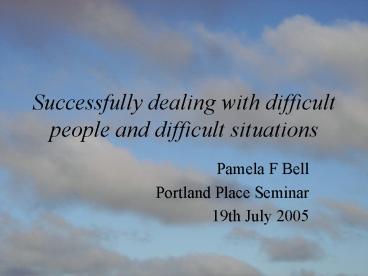Successfully dealing with difficult people and difficult situations - PowerPoint PPT Presentation
1 / 16
Title:
Successfully dealing with difficult people and difficult situations
Description:
Dealing with the everyday difficulties' of working with ... Go-getter, carer, analytical, socialising. Myers Briggs type indicator. extrovert E / introvert I ... – PowerPoint PPT presentation
Number of Views:3201
Avg rating:5.0/5.0
Title: Successfully dealing with difficult people and difficult situations
1
Successfully dealing with difficult people and
difficult situations
- Pamela F Bell
- Portland Place Seminar
- 19th July 2005
2
What this session is not about!
- Referring colleagues to the GMC!
- SERIOUS PERFORMANCE FAILURE
- SERIOUS HEALTH PROBLEMS (including drug and
alcohol addiction) - SERIOUS MISCONDUCT
- Referring the Trust to the NCAA!
- Dealing with serious systems failures
3
What this session is about!
- Dealing with the everyday difficulties of
working with colleagues in teams to ensure that
optimum care is delivered to your patients.
4
Why are some people so difficult?
- Stop and think - just who is being difficult
here? - Is there a clash of personality types?
- Different personality types communicate their
feelings and wishes in different ways - People who are inflexible and locked in their own
style are experienced as difficult and the
source of conflict
5
Personality types
- Carl Jungs four personality types
- Go-getter, carer, analytical, socialising
- Myers Briggs type indicator
- extrovert E / introvert I
- intuitive N / sensing S
- thinking T / feeling F
- judging J / perceiving P
6
What skills do you need to cope with difficult
people?
- First know yourself
- How does your emotional intelligence affect the
way in which you view others? - How does your personality type alter your
behaviour with respect to others? - How does your behaviour alter when stressed?
7
What skills do you need to cope with difficult
people?
- Start with areas where you know you are in
agreement - It is then much easier to talk calmly about the
areas of difficulty - Assume nothing - test everything!
- Watch for should and ought these imply
judgement
8
Giving Feedback
- Focus on description not on judgement
- Focus on sharing ideas/information rather than
giving advice - Focus on the needs of the receiver not on those
of the giver - Focus on the behaviour that the receiver can do
something about - Focus on what is said rather than why it is said
- Check that the information is clear/accurate
9
Why are some situations so difficult?
- Change - good or bad?
- Is the change sought or imposed?
- Is it threatening? And to whom?
- Will there be new teams? How will they function?
- Where is the power? And who will wield it?
10
What do you need to cope with difficult
situations?
- Vision
- What is your preferred outcome? What are you
trying to achieve? - Support
- Who shares your vision and what can they do to
achieve your preferred outcome?
11
What skills do you need to cope with difficult
situations?
- Communication
- verbal and non-verbal
- watch carefully for situations where these are
not aligned
12
What skills do you need to cope with difficult
situations?
- Conflict resolution
13
Thomas Kilmann Conflict Mode Instrument
ACCOMMODATING
COLLABORATING
high
COMPROMISING
Co-operation
AVOIDING
COMPETING
low
Assertiveness
assertive
unassertive
14
What skills do you need to cope with difficult
situations?
- Negotiation skills
- planning
- asking questions
- testing understanding and summarising
- avoiding defend/attack spirals
- avoiding argument dilution
- commenting on feelings
- reviewing the negotiation
15
Reading
- Resolving Conflict, S and M McConnon
- Communication Skills for Effective Management, O
Hargie, D Dickson, D Tourish - The 7 Habits of Highly Effective People, S Covey
- The Art of War, Sun Tze
- Inspiring Leadership, J Adair
- Management in Health Care the Role of Doctors,
General Medical Council
16
Successfully dealing with difficult people and
difficult situations
- Pamela F Bell
- Portland Place Seminar
- 19th July 2005































